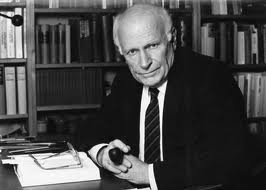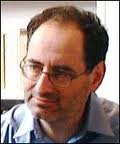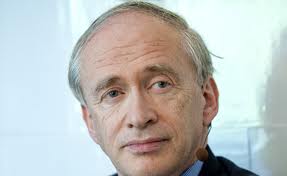
Applying Reinhart Koselleck’s conception of historical time to ideology in America
Last week, I gave a talk at Oxford’s Rothermere American Institute about the German historian Reinhart Koselleck (left) and the relevance of his conception of ‘historical time’ to the study of ideologies in America. We are used to thinking about ideology as a pejorative term — a utopian blueprint for world order with all the consequences that totalitarianism brings. But this is a narrow view. Ideologies are, more broadly speaking, a particular type of political thinking that operates in-between political philosophy and what we can call ‘real politics’ — that is the practical doing (and thinking) that goes on in political life. By ‘in-between’ I mean distinct from philosophy and ‘real politics’, but not mutually exclusive to them. Ideologies are, to put it crudely, where ideas and political action meet; they are ideas with an active prescriptive component which aim for political influence. Ideologies are types of political thought that want to influence political conduct.

Remembering Peter David
Last week, whilst teaching a course at Colorado College, I wrote a piece for The Economist about a bill to allow civil unions in the state, which was combined with reporting on Obama’s announcement in support of gay marriage and that passage of North Carolina’s constitutional amendment banning gay marriage. This larger story – Colorado is rather small beer, to be fair – meant that my piece went from 500 words to about 150. Given that I am an infrequent freelancer, usually I’d be gutted, but this meant a few lines in an article written for the most part by Peter David, the Washington bureau chief and Lexington columnist, who I just found out died tragically in a car crash …

What is Political Thinking?: A Q&A with Professor Michael Freeden
Recently retired from Mansfield College, Oxford, Professor Michael Freeden, a political theorist is best known for his work on political ideologies, a subject often maligned as an inferior cousin of political philosophy and political theory. Marx did no favours for the term, of course, and End of Ideology thinkers like Daniel Bell and Seymour Martin Lipset defined ideologies so narrowly and pejoratively that few are inclined to attach their thinking to the moniker – or believe it is worth studying. But scholars interested in the interaction between ideologies and language, like Freeden, and also post-Marxist scholars like Ernesto Laclau and Chantal Mouffe, have resurrected the study – and the word. In his landmark book, Ideologies and Political Theory, Freeden argues that …

American Conservatives in Crisis?: a Q&A with Oxford’s Gillian Peele
Only three years ago, pundits and political scientists saw the 2008 American presidential election as the beginning of a new era in Washington: the rise of President Obama and a strong Democratic majority in both houses of Congress meant that after eight years away from Pennsylvania Avenue, liberals could again implement political programmes and reforms free from Republican meddling. It provided an opportunity for a fresh progressive platform and created a new mood unlike any since the early years of the Clinton administration, or maybe since the dawn of the Great Society in the 1960s. The conservatives, meanwhile, were in despair; heavy losses darkened the mood and they saw Obama as a charismatic leader who would be difficult to beat, …
Why Reinhold Niebuhr?
Pardon the self-promotion: I reviewed a new book on Reinhold Niebuhr, a theologian and realist political thinker during the Cold War, in last week’s Economist. Niebuhr died in the 1970’s but both Democrats and Republicans lean on his advice (even if misread) to guide their modern foreign policy views. Here is a snippet from my review of the book, Why Niebuhr Now?, by John Patrick Diggins, the late American intellectual historian. AFTER years in the doldrums, Reinhold Niebuhr, an American theologian, is enjoying a comeback. Although Niebuhr died in 1971, he is nowadays often name-dropped in opinion columns and highbrow chat as the ideal mind to help guide 21st-century political leaders through the ups and downs of world affairs. It …
Ideology in Dance
As regular denizens of Oxford’s Centre for Political Ideologies (a research centre in the DPIR) know, unlike most branches of political theory and political philosophy, studying ideologies requires more than unpacking the canonical texts of great thinkers. Not always bad things (like totalitarianism or fundamentalism), ideologies occupy the space between ivory tower ideas and day-to-day politics and thus come in many forms – speeches, slogans and sermons. But even ideology-focused students, including your blogger, forget to look for political messages in more creative spaces. Like dance. Luckily this is what my Dphilling colleague Dana Mills, an accomplished dancer herself, focuses on most. Dana always urges me to look at the similarities between my word heavy work on liberalism and the …
Remembering the Orange Revolution
Before the varied attire of Arab Spring protesters, in recent times, revolutions tended to come in colours. Ukraine was awash with orange. Kyrgyzstan chose pink and Georgia rose. Thailand could not make its mind up over red and yellow. Choices varied but in each instance pigmentation signified unity behind certain causes and grievances. Yet in some cases the colours imbued more than solidarity – they bred an artistic renaissance. Last Friday, Olga Onuch, a former DPhil student in the DPIR and now a post-doc at the University of Toronto, and her father, Jerzy Onuch, spoke about the intersection between art and protest. Both know a lot about the topic: it is the subject of Ms. Onuch’s recently completed PhD dissertation …









